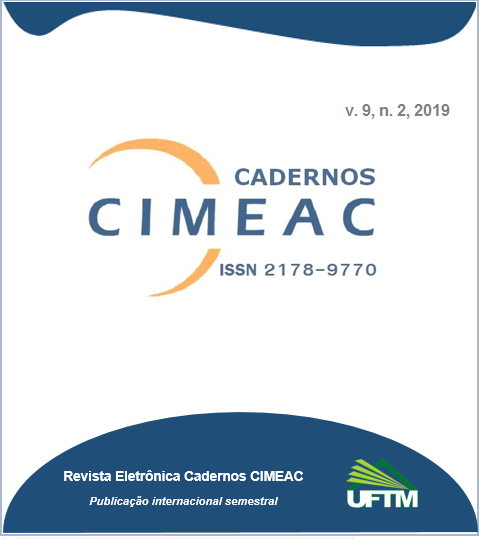Potências de uma escola ribeirinha paraense: vidas, fronteiras e um rio / Potency of a riverside school in Pará: lives, borders, and a river
DOI:
https://doi.org/10.18554/cimeac.v9i2.2866Resumo
A presente escritura é parte de uma pesquisa de mestrado em andamento, que problematiza o currículo de uma escola básica ribeirinha da Amazônia paraense a partir do pensamento da diferença do filósofo francês Gilles Deleuze. Os estudos teóricos acerca do currículo enquanto campo de conhecimento científico, as travessias pela Baía de Guajará e a investidura na escola como território de experimentação empírica mobilizaram a escrita desse artigo, que objetiva problematizar as potências de uma escola ribeirinha a partir da relação fronteiriça entre a escola, a Ilha do Combu e Belém do Pará. Desse modo, o estudo considera uma escola básica ribeirinha, como um território permeado por potências, por vida escolar e pelas vidas que nela circulam em sua força criadora e que, de modo peculiar, pulsam nessa ambiência que produz acontecimentos e multiplicidades. Nesse sentido, assume a cartografia como percurso metodológico, assumir tal caminho é como traçar um mapa móvel, no qual não cabe controlar as intensidades que o compõe, tampouco suas afetações intensivas e extensivas que dão vazão a dimensão rítmica do território no qual a vida escolar na Ilha do Combu pulsa. Problematizar potências de uma escola pela lente da cartografia implica operar com conceitos deleuzianos como território e multiplicidades, que no deslocamento conceitual que proponho realizar, contribuem para mobilizar o pensamento e colocar em questão o vitalismo que pulsa na escola e a faz território de resistências.
Palavras-chave: Escola ribeirinha; Ilha do Combu; Educação básica.
ABSTRACT: The present writing is part of an ongoing master's degree research, which problematizes the curriculum of a basic riverside school in the Amazon of Pará from the thought of the difference of the French philosopher Gilles Deleuze. The theoretical studies about the curriculum as a field of scientific knowledge, the crossing of the Bay of Guajará and the investiture in the school as territory of experimentation mobilized the writing of this article, which aims to problematize the powers of a riverside school from the border relationship between the school , the Island of Combu and Belém do Pará. In this way, the study thinks of a basic riverside school, as a territory permeated by potencies, for school life and for the lives that circulate in its creative force and that, in a peculiar way, pulsate in this environment that produces events and multiplicities. In this sense, assuming cartography as a methodological course, assuming such a path is like drawing a mobile map, in which it is not possible to control the intensities that compose it, nor its intensive and extensive affectations that give vent to the rhythmic dimension of the territory in which school life on the Island of Combu pulsates. To problematize a school's powers through the lens of cartography implies working with Deleuzian concepts as territory and multiplicities, which in the conceptual displacement that I propose to carry out, contribute to mobilize the thought and question the vitalism that strikes the school and makes it a territory of resistances.
Keywords: Riverside school; Island of Combu; Elementary school.
Downloads
Publicado
Edição
Seção
Licença
Os autores que publicam nesta revista concordam com os seguintes termos:
(a) Não cobramos dos autores para a publicação neste periódico.
(b) Autores mantém os direitos autorais e concedem à revista o direito de primeira publicação, com o trabalho simultaneamente licenciado sob a Licença Creative Commons que permite o compartilhamento do trabalho com reconhecimento da autoria e publicação inicial nesta revista.
(c) Autores têm permissão e são estimulados a difundir e a distribuir a versão publicada de seu trabalho online (ex.: em repositórios institucionais ou na sua página pessoal) após o processo editorial, já que isso pode aumentar o impacto e a citação do trabalho publicado (Veja O Efeito do Acesso Livre).
* * *
AUTHORS COPYRIGHT AND PUBLISHING RIGHTS
Authors who publish with this journal agree to the following terms:
(a) This journal does not charge authors for publication.
(b) Authors retain copyright and grant the journal right of first publication with the work simultaneously licensed under a Creative Commons Attribution License that allows others to share the work with an acknowledgement of the work's authorship and initial publication in this journal.
(c) For authors whose articles have been accepted: authors are permitted and encouraged to post their work online (e.g., in institutional repositories or on their website) after the publication of the text in Cadernos CIMEAC, as it can lead to productive exchanges as well as earlier and greater citation of published work (See The Effect of Open Access).


 10.18554/cimeac
10.18554/cimeac


